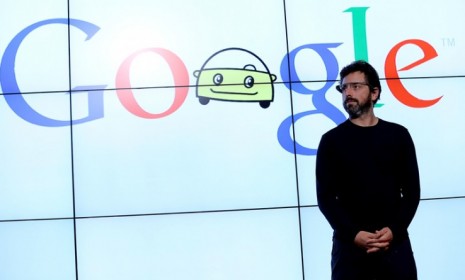Play all audios:
Until Apple took the crown in 2010, Microsoft spent many, many years as the world's most valuable technology company. And now, for the first time ever, Google has leapfrogged its
Redmond-based rival, too, taking the second place slot behind Tim Cook and Co.'s best-selling iProducts, and relegating Microsoft to the bronze medal podium. The search giant has
enjoyed a strong run in recent months — share prices are up 30 percent for the quarter — and has now overtaken Microsoft's $247.27 billion market capitalization, clocking in at one
point with a $248.89 billion market cap of its own. (Apple is still _way_ out in front, with a market cap well north of $600 billion.) What accounts for Wall Street's renewed confidence
in Google, which as recently as 2007 was seen as a risky investment? Here, four theories: 1. GOOGLE HAS A VICE-LIKE GRIP ON SEARCH Google controls 66 percent of the U.S. search market, says
Brian Womack at _Bloomberg_. Microsoft, which entered the search market in 2009 with Bing, comes in at a "distant second" with 16 percent. And Google's stranglehold on search
positions the company to become the biggest online display advertising company in the world. Google's global revenue from online ads is likely to hit $6 billion this year, displacing
even first-place Facebook, Citigroup analyst Mark Mahaney tells Britain's _Financial Times__._ SUBSCRIBE TO THE WEEK Escape your echo chamber. Get the facts behind the news, plus
analysis from multiple perspectives. SUBSCRIBE & SAVE SIGN UP FOR THE WEEK'S FREE NEWSLETTERS From our morning news briefing to a weekly Good News Newsletter, get the best of The
Week delivered directly to your inbox. From our morning news briefing to a weekly Good News Newsletter, get the best of The Week delivered directly to your inbox. 2. MICROSOFT'S
SOFTWARE BUSINESS HAS BEEN BATTERED "The PC hardware business is obviously struggling," Martin Pyykkonen, an analyst at Wedge Partners Corp., tells _Bloomberg_. That's bad
news for Microsoft, which has long made a ton of money with its PC operating system. Although the company still gets most of its revenue from Windows and Office software, sales have slumped
as more consumers turn to Android tablets or iPads to handle their home computing needs. Simply put: Customers are looking to the Cloud, not the disk drive. 3. MICROSOFT HAS YET TO PROVE IT
CAN GO MOBILE Windows 8 is set to debut later this month, and while the new operating system "is designed to be Microsoft's first to translate tidily from PCs to smartphones and
tablets, Microsoft has spent years failing to prove it gets mobile," says Marcus Wohlsen at _Wired_. Yes, "Windows 8 looks promising, but it's hard not to picture Microsoft as
an old silverback with its arms wrapped around an old Dell desktop." As for Google... 4. ANDROID IS ALREADY EVERYWHERE The search giant is "beating its chest with the success of
Android," says _Wired_'s Wohlsen. The mobile operating system runs on more than two-thirds of the world's smartphones shipped during the second quarter. Windows Phone, on the
other hand, ran on fewer than 4 percent of the devices shipped during the same period. Today, Google is more than the king of search, says Nick Wingfield at _The_ _New York Times_. It took
some time, but it's clearly that "Google is beginning to convince investors that it is more than a one-trick pony."

